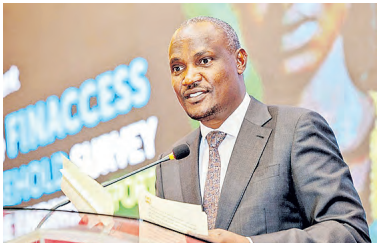

The National Treasury has admitted that high taxes on salaries are among the three key reasons Kenyans have no money in their pockets despite an improved economy.
Speaking at the launch of the FinAcess Survey 2024 by the Central Bank of Kenya (CBK), Kenya Bankers Association (KBA) and FSD, Treasury CS John Mbadi promised to ask the cabinet to consider easing Pay-As-You-Earn as the budget deficit shrinks.
“We have listed to the public. While inflation has eased to a 17-year low, shilling strengthened against major currencies and indicators showing that the economy is growing above Sub-Saharan Africa’s average, people say they have no money. We have interrogated the cause,’’ Mbadi said.
“Taxes take eight per cent of salaries. That is huge. Other factors are high bank rates that are hindering credit uptake and non-payment of pending bills. We continue to urge financial institutions to lower lending rates to support businesses.”
Mbadi attributed the high taxes to a huge budget deficit that was initially at above Sh900 billion which forced the government to enhance domestic revenue mobilisation after ruling out more debt.
“We have put in place various policy measures that have seen the deficit drop to Sh780 billion and we are anticipating the budget deficit to drop further to below Sh760 billion next financial year. As it drops, benefits will be passed to employees,’’ Mbadi said.
He further appealed to the CBK governor to intensify talks with lenders to slow down lending rates, saying that most small businesses are locked out of the credit market.
“I thank the CBK governor for the continued talks with the banks. I have always told banks that an ease in lending rates or a hike affects them directly. Although the base-lending rate has dropped to 12 per cent, we anticipate a further drop when CBK’s monitory committee meets Thursday. “
Last
week, the bankers’ lobby asked the
apex bank to cut its benchmark
rate at its final Monetary Policy
Committee (MPC) meeting of the
year on December 5, 2024.










